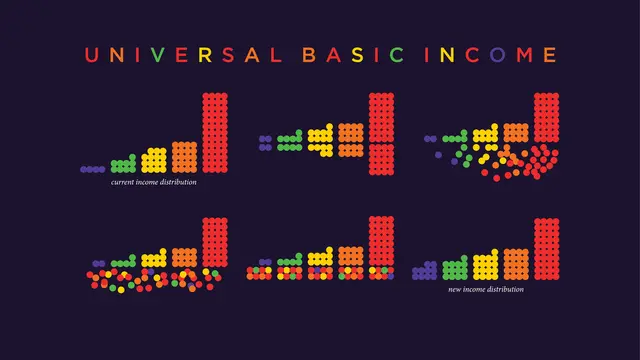
Apr 17, 2023 • UBI
My Journey Through Universal Basic Income (UBI)
Can Money Really Grow on Trees?

Lately, I've been hearing the term "Universal Basic Income" (UBI) thrown around in conversations and news articles. Naturally, I became curious and decided to dive deep into this fascinating topic. So, come along with me as we explore UBI, its history, philosophy, advantages and disadvantages, and how it fits into a capitalist society. Oh, and we'll also take a little trip around the world to check out some countries that are giving UBI a test drive!
What is Universal Basic Income (UBI)?
UBI is like receiving a regular paycheck from the government just for being alive. That's right—every person in a given population would receive a fixed amount of money, regardless of their job status or income level. The idea behind UBI is to provide a financial safety net, ensuring that everyone gets at least a little dough to cover their basic needs. Imagine it as an allowance from your rich Uncle Sam.
The History of UBI
Now, you might think UBI is a shiny new concept, but it's actually an oldie. Philosophers and economists like Thomas More, Thomas Paine, and John Stuart Mill have toyed with the idea of providing a guaranteed income to citizens since way back when. Fast forward to the 20th century, when robots started taking our jobs and the idea of wealth redistribution started picking up steam.
Advocates of UBI
Some big names have jumped on the UBI bandwagon, including politicians, economists, and tech tycoons like Andrew Yang, Elon Musk, and Mark Zuckerberg. They're all singing the same tune: UBI can help ease poverty, level the playing field, and offer some financial stability in these crazy, uncertain times.
Pros of UBI
- Poverty reduction: It's simple math—give people money, and they're less likely to be poor.
- Financial security: With UBI, you won't need to panic about paying the bills if you lose your job or decide to pursue a career as a professional yo-yo master.
- Economic stimulation: When people have more money, they tend to spend it, which is great for the economy.
- Streamlined welfare system: Goodbye bureaucratic red tape, hello simplicity and dignity!
Cons of UBI:
- Cost: UBI isn't cheap. We might have to dig deep into our pockets or shake down the ultra-rich to make it happen.
- Disincentive to work: If you're getting free money, why bother working? (Well, maybe because you still want that shiny new car or a trip to Hawaii!)
- Inflation: There's a risk that if everyone suddenly has more cash, prices might shoot up, leaving us back at square one.
UBI and Capitalism
Now, you might be wondering how UBI fits into our capitalist society. Well, it's a bit like giving everyone a pair of running shoes in a race—it doesn't guarantee you'll win, but at least you won't start barefoot. UBI offers a guaranteed income, empowering us to pursue our dreams without worrying about where our next meal will come from. Plus, when we spend our UBI on avocado toast and lattes, it helps boost the economy.
Countries Piloting UBI Programs
Some countries have taken UBI for a test run, including Finland, Canada, Spain, and even parts of the United States. The results are a mixed bag—some studies show people are happier and healthier, while others say it doesn't make much of a dent in the job market. But hey, Rome wasn't built in a day, right?
Conclusion
As we navigate through the choppy waters of income inequality, automation, and economic uncertainty, the idea of Universal Basic Income is like a shiny life raft on the horizon. While pilot programs have shown some promise (along with a few hiccups), it's clear that we need more research and experimentation to figure out if UBI is the golden ticket we've been searching for.
So, as we move forward, it's important for all of us—policymakers, citizens, and professional yo-yo masters alike—to engage in informed, thoughtful discussions about UBI's potential role in our society. Maybe, just maybe, we'll find out that money can grow on trees (or at least on the government's printing press).




